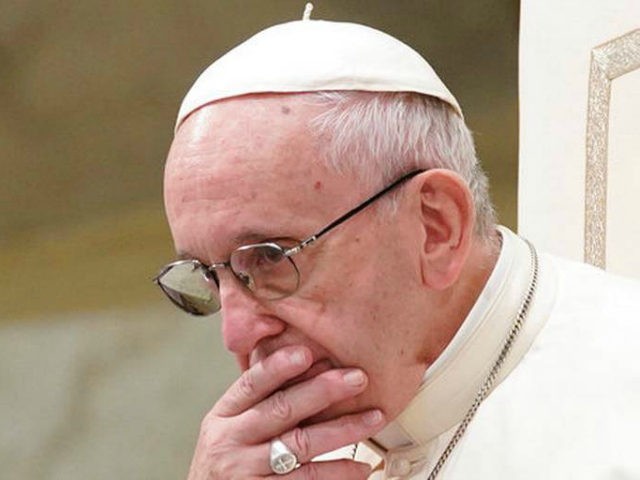The year 2020 was marked by the global coronavirus pandemic, Pope Francis said Thursday, but also saw a worrisome a surge in “nationalism, racism, and xenophobia.”
“Sad to say,” alongside all testimonies of love and solidarity during the coronavirus pandemic, “we have also seen a surge in various forms of nationalism, racism and xenophobia, and wars and conflicts that bring only death and destruction in their wake,” he said in his message for the 2021 World Day of Peace, released Thursday.
In recent months, the pope has returned time and again to the topic of nationalism, tying it to the human person’s lowest instincts.
The pontiff presented his ideas for the “great reset” to the General Assembly of the United Nations in late September, urging the adoption of multilateralism and globalism — which he described as “God’s plan for our world” — over a return to nationalism and sovreignism.
“We are faced, then, with a choice between two possible paths,” Francis stated at the time. “One path leads to the consolidation of multilateralism as the expression of a renewed sense of global co-responsibility, a solidarity grounded in justice and the attainment of peace and unity within the human family, which is God’s plan for our world.”
“The other path emphasizes self-sufficiency, nationalism, protectionism, individualism and isolation,” he continued. It “excludes the poor, the vulnerable and those dwelling on the peripheries of life. That path would certainly be detrimental to the whole community, causing self-inflicted wounds on everyone. It must not prevail.”
Francis delivered a similar message the following month in his encyclical letter titled Fratelli Tutti (Brothers All), in which he decried the resurgence of populism and nationalism on the world stage and called for greater multilateralism.
Our own days seem to be showing “signs of a certain regression,” the pope wrote. “Ancient conflicts thought long buried are breaking out anew, while instances of a myopic, extremist, resentful and aggressive nationalism are on the rise.”
“In some countries, a concept of popular and national unity influenced by various ideologies is creating new forms of selfishness and a loss of the social sense under the guise of defending national interests,” the pope wrote in the 43,000-word letter, which was released on October 4.
Pope Francis has reiterated his call for a more welcoming attitude toward migrants, insisting everyone has the right to “dream of a better future.” https://t.co/tdUk6Oeeju
— Breitbart News (@BreitbartNews) October 5, 2020
As he has done on other occasions, Francis attributed renewed nationalist sentiment to growing xenophobia, narrowmindedness, and selfishness.
There are those “who appear to feel encouraged or at least permitted by their faith to support varieties of narrow and violent nationalism, xenophobia and contempt, and even the mistreatment of those who are different,” the pope stressed. “Faith, and the humanism it inspires, must maintain a critical sense in the face of these tendencies, and prompt an immediate response whenever they rear their head.”
“Narrow forms of nationalism are an extreme expression of an inability to grasp the meaning of… gratuitousness,” Francis asserted. “They err in thinking that they can develop on their own, heedless of the ruin of others, that by closing their doors to others they will be better protected.”
“Immigrants are seen as usurpers who have nothing to offer,” he added. “This leads to the simplistic belief that the poor are dangerous and useless, while the powerful are generous benefactors.”
“Sadly, politics today often takes forms that hinder progress towards a different world,” he said. “Lack of concern for the vulnerable can hide behind a populism that exploits them demagogically for its own purposes, or a liberalism that serves the economic interests of the powerful.”
While the pope did not name names in his denunciation of the rise of an “aggressive nationalism,” recent years have witnessed a resurgence of nationalism in Europe, Asia, the Americas, and elsewhere.
“Over the past years, rising nationalism is seen everywhere and in everything,” declared a 2018 essay in the Journal Ethnopolitics.
“From the election of Donald Trump to Brexit, the nationalist policies of the Japanese Prime Minister Shinzō Abe, his Indian counterpart Narendra Modi and the Turkish president Recep Tayyip Erdoğan, the success of far-right parties in Italian, German and Austrian elections in 2017 and 2018, nationalism appears to be on rise globally,” it declared.
In later October, Pope Francis Pope Francis again attacked nationalism, suggesting that Europe, and especially Italy, is repeating the errors of pre-Nazi Germany by allowing new nationalisms to take hold.
In an address to socialist Spanish Prime Minister Pedro Sánchez, Pope Francis recommended a book by “an Italian intellectual from the Communist Party” with the “very evocative title: Syndrome 1933.”
In his 2019 book, Siegmund Ginzberg drew a parallel between what was happening with the rise of Adolf Hitler and the Nazi party in 1933 to Italy in 2019, where a new anti-immigrant nationalism and populism threaten to become the dominant political movement.
This again… https://t.co/TGWccqI8wB
— Breitbart News (@BreitbartNews) December 12, 2020
The book “refers to Germany, obviously,” the pope said Saturday. “With the fall of the Weimar Republic emerged a whole mix of possibilities to get out of the crisis. And there an ideology began to show that the path was National Socialism and it went on and on and arrived at what we know: the drama that was Europe with that homeland invented by an ideology.”
“Because ideologies sectarianize, ideologies deconstruct the homeland, they do not build,” Francis continued. “Learn that from history. And this man in that book very delicately makes a comparison with what is happening in Europe. He says: Be careful that we are repeating the similar path.”
“It is worth reading,” he said.

COMMENTS
Please let us know if you're having issues with commenting.